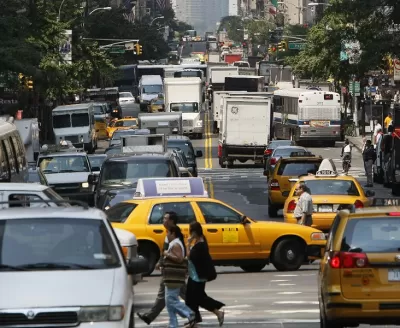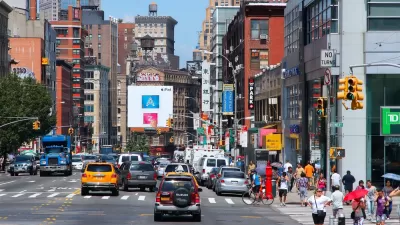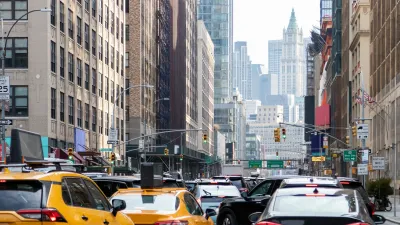Congestion management using parking strategies would be more politically palatable while delivering significant outcomes.

Jay Primus outlines a three-pronged approach for New York to tackle congestion through parking-related measures. The first part would prohibit monthly parking and instead require parking be offered in hourly increments, as a way to encourage people to think about each driving trip they make.
The second strategy, increasing the parking tax, would ease congestion and provide additional benefits, says Primus:
This is a straightforward, efficient and sensible way to gently discourage driving while helping to finance public transit improvements. As those with higher incomes are more likely to drive into the city, making parking cost a little more to subsidize public transit will improve equity.
The third part would require garages and lot operators to offer lower off-peak parking prices. This is another way to encourage drivers to consider their trips and shift their travel to off-peak hours, which would then spread vehicle travel out over time. This strategy, adds Primus, also is more politically acceptable:
The magic of this approach is that it is tantamount to a peak period surcharge but framed as an off-peak discount — no one (other than economists) likes peak period surcharges, but everyone loves a discount. The effect is the same but the political viability is crucially different.
Primus suggests that these strategies be used in conjunction with other congestion management tactics, including parking meter pricing, management of residential street parking, and transportation subsidies for employees instead of parking subsidies.
He also urges New York to adopt these strategies in order for it to be a leader in forward-thinking congestion management. “Cities are looking for ways to be smart — and this no-tech, no-cost, data-free and politically feasible approach to congestion management could be the smart way forward,” says Primus.
FULL STORY: A Better Way to Get New York’s Traffic Moving

Alabama: Trump Terminates Settlements for Black Communities Harmed By Raw Sewage
Trump deemed the landmark civil rights agreement “illegal DEI and environmental justice policy.”

Study: Maui’s Plan to Convert Vacation Rentals to Long-Term Housing Could Cause Nearly $1 Billion Economic Loss
The plan would reduce visitor accommodation by 25% resulting in 1,900 jobs lost.

Planetizen Federal Action Tracker
A weekly monitor of how Trump’s orders and actions are impacting planners and planning in America.

Waymo Gets Permission to Map SF’s Market Street
If allowed to operate on the traffic-restricted street, Waymo’s autonomous taxis would have a leg up over ride-hailing competitors — and counter the city’s efforts to grow bike and pedestrian on the thoroughfare.

Parklet Symposium Highlights the Success of Shared Spaces
Parklets got a boost during the Covid-19 pandemic, when the concept was translated to outdoor dining programs that offered restaurants a lifeline during the shutdown.

Federal Homelessness Agency Places Entire Staff on Leave
The U.S. Interagency Council on Homelessness is the only federal agency dedicated to preventing and ending homelessness.
Urban Design for Planners 1: Software Tools
This six-course series explores essential urban design concepts using open source software and equips planners with the tools they need to participate fully in the urban design process.
Planning for Universal Design
Learn the tools for implementing Universal Design in planning regulations.
Caltrans
Smith Gee Studio
Institute for Housing and Urban Development Studies (IHS)
City of Grandview
Harvard GSD Executive Education
Toledo-Lucas County Plan Commissions
Salt Lake City
NYU Wagner Graduate School of Public Service




























